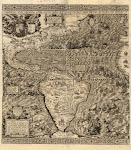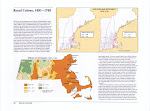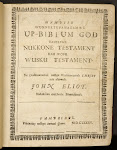Thursday, February 18, 2010
Woody Holton on Elites in the American Revolution
This week I'd like you to take a look at the Woody Holton article from Major Problems (this reading is posted under assignments on the course Blackboard site; the Holton essay is at the end of the reading) and do the following: outline Holton's basic argument. This is an excellent way to prepare for writing your primary source paper (due at the beginning of class Tuesday night).
Subscribe to:
Post Comments (Atom)


















Elite Concerns about the American Revolution
ReplyDeleteI Colonial Government Ideology
A. Britan’s current system
B. Reasons for colonial change
C. Government structure propositions
II The Debates
A. Washington speaks on a reluctant Independency
B. Landon Carters speaks against republics
C. Carter Braxton argues for mixed government
III Common Sense
A. Thomas Paine speaks on republicanism
B. Small holder influence
C. Dissenters want religious freedom
IV Elections
A. Incumbents fall
B. Common people speak
C. The cry for independence
V. A Free Virginia
Peter Nickell
ReplyDeletePoor whites sought the new government because they believed it would “amend to their influence” which in Holton’s eye’s is wrong. He did not believe the government should act for the poor. They also wanted the ability to restructure it as they saw fit which was also wrong to him. The three main identities in British government (aristocracy, monarchy and democracy) would not be recreated in this newly seceded colonies. There would be a lack of hereditary identity in society as well. Because of this there would be no throne, no king, no royal family. They also talked of simple democracy and a republic which would be too responsive to voters concerns. The people would not know their own place and would not be willing to “stick” there. There is also a threat that under this government poor farmers could “seize property” from the rich. His one real legitimate complaint thus far is that people will vote for someone who promises everything but will be unable to deliver on all of it. The new government would “expand” people’s freedom across the land.
He just argued no one but the rich and powerful should have a say in government affairs. That the poor had no right to interfere with federal business. It’s weird to think this is how the higher-ups acted in those days. I really hope this was a joke.
Matt Adamitis
ReplyDeleteWith the realization that Virginia's independence might actually occur, colonists tried to picture what the new colonial government would look like. Colonists knew that they would not be able to carry on the same type of institution as the British government. They lacked any form of a monarch or aristocracy, which left only the house of commons as a possible type of ruling body for a new colonial government. This system of government would be entirely elected and swayed by the general public, which frightened the gentry of Virginia. Many believed that this much power in the hands of the common people would ruin them. One common sentiment was that too much money in any one place was contrary to an effective republic. There was, however, little the gentry could do to stop the growing appeal of a republican government, especially after the publication of "Common Sense." The central theme of Thomas Paine's pamphlet was that the common people did have enough sense to rule themselves, which was a massage that spread like wild fire throughout the colonies. Many were also attracted by the idea that a republic would also grant freedom to all religions, and abolish the Anglican Church as Virginia's state religion. By this time, the cry for a separate democracy from England had gained enough momentum to ensure that representatives that would vote for independence would be elected to Virginia's final convention.
Holton’s main point is that even though the upper class of people in Virginia didn’t want the new government to give much, if any power, to the people, it was basically set up by the time it came to decide so that it would have been nearly impossible for that not to be the case. The gentlemen he speaks of had a few major reasons for disapproving of a majority-led government. They were afraid that a pure democracy, like the one suggested, would be subject to “internal commotions” which could cause “dissentions, civil war, massacres, and bloodshed.” An elite government could more effectively suppress these uprisings and keep everyone safe (and silenced). Another more selfish concern was that if small planters gained power, they would try to seize the land of the rich landowners, which clearly would not be good for their profits. Finally, they just don’t believe that the commoners have enough common sense to rule themselves, thinking that they would be very easily corrupted.
ReplyDeleteMost people, of course, disagreed with all of this, and when the time came to vote for independence and for their new leaders, the common people made it very clear that they wanted to represent and speak for themselves. This, of course, made the elite shareholders quite nervous, and they were afraid that all their fears would in fact occur. Before long, Virginia, and the rest of the thirteen colonies with it, were free of British rule.
The common man saw the new government as an opportunity to have a say in the law of the land. This troubled the wealthy, as pointed out by the views of Holton, who believed the government should not act in favor of the poor. It was evident the new government could not replicate that of England. There was no monarchy, or a presence of a Royal Family. The only similarity was the House of Commons, but that gave too much power to the common man, who could now directly influence govt. through votes.
ReplyDeleteHolton argued that none but the rich should have a say in govt. and more importantly, that the poor should not be involved in the process whatsoever.
"Common Sense," by Thomas Paine really opened the eyes of the colonists. In his book, Paine argued that the common people could in fact rule the land. People also liked the idea of religious freedom and the abolishment of the Anglican Church. Thus, the commoners made it very clear they wished to represent themselves and to be heard. Eventually their ability to vote gave them a voice which eventually became a cry for independence. This ultimately led to departure of British rule.
EGarcia....
ReplyDeleteThe majority of the people wanted a new government in Virginia. the majority consist of the lowered class people. The colonist concerned about this problem that could lead to an independe revolution try to prevent the new government without causing a revolution. Holton's ideas was that the upper class should not lose any of the power since he believe that common people didnt have enough sense to rule themselves. Holton's didnt want the new government to act for the poor. He believe that the poor had no right no interfere with federal business. The main objective for not approving a majority lead government was that it could lead to massacres, bloodsheds, and civil wars. But since the majority of the people wanted a new government, when it was time to vote for leaders & independence, the common people choose to be heard and not overlooked. This lead to Virginia and all the colonies under British power to be free.
Jigisha Dalal
ReplyDeleteThe colonists knew that the British government would not as stable here in America. They did not have a royal family to take control, all they had were the common people. As the common people saw a opportunity to have a say in the new land, it began to put the wealthy in a bad position. Holton did not believe the government should help the poor, because they did not have enough sense to rule themselves. He feared that a democracy would cause commotions, and that an elite government could more effectively suppress these uprisings and keep everyone safe. And because there was no royal family they had to give power to the common man, which would change the government.
Thomas Paine's book on "Common Sense" made colonist realize that they could take on the role of government. In this book he argues that the common people can take control of this land, and that they like the idea of abolishing the Anglican Church and religious freedom.
Thus, the common people wanted to vote for someone who would listen to them and help them. This new government will help spread freedom, and eventually this ability to vote would give them a chance for independence.
The common white man desired to be apart of the governing process and saw it as a way to have a say in the way things were going in Virginia. Holton opposed this and did not think that the government should act on behalf of the poor; Rather, he thought that Virginia's government should be reserved for the wealthy only. Although there were no royal families to establish a monarchy in Virginia, the elitists believed that it would be impossible to implement a House of Commons to govern Virginia because the common people were unable to govern themselves sensibly. After the publication of "Common Sense" by Thomas Paine, the idea that common people did possess the sense and intellect to govern themselves properly. This lead to most people wanting self representation and to speak on their own behalf. The idea of a free colony caught on very quickly and ultimately lead to all of the 13 colonies breaking away from Britain to be free.
ReplyDeleteRaed Khawaja
ReplyDeleteBasically, Holton did not believe that the common man had the intellect to govern themselves let alone others. This was especially relevant to him in regards to the wealthy. He believed the rich should govern because they are most fit to do so. Ironically this was not a departure from the new land was fleeing. Although there was no royal family, one would essentially be created, except the blood of relation would merely be wealth. It wasn't until people like Thomas Paine reasoned the faculty it required to rule did not require wealthy background that this sought legitimate rivalry. This was a key element to the survival of the ideal of democracy that exists today.
Jordan Thompson
ReplyDeleteHolton believed that, although the common man wanted to be part of government, they did not have the knowledge and therefore were not fit to be a part of government. Holton believed that Virginia's government should be run by the wealthy only because they were more fit to do so. Holton was against democracy and felt an elite government would be more effective when trying to control uprisings. However, things would not turn out the way Holton wanted them too. There was no way for the common man not to be heard because they did majority voting for the government and the wealthy were a very small segment of the population. The common man made his voice be known through majority voting and it eventually lead to all thirteen colonies becoming free from British rule.
Woody Holton
ReplyDeleteElite Concerns about the American Revolution
The majority of people whom were those Poor whites wanted a new government that would amend to their influence. They want to restructure the whole British government system, so there is no aristocracy, monarchy and democracy. This of course wasn’t in the rich people interest. Holton believed that only wealthy people should the right to be involved in the new reform and poor people shouldn’t have a voice in this process at all. Holton pointed that the rich people shouldn’t lose any of their power. He argued that the commoner don’t have enough sense to rule themselves. However, the majority of people win in the end when it comes time to vote as Thomas Paine's book "Common Sense" were one of the main reasons of this victory and this remark the end of British role and Virginia independence.
As the American Revolution approached, people began to wonder what a new Virginian government would consist of following Independence from Britain. Once colonists realized that independence from European influence was an attainable goal, they began to envision the advantages and disadvantages of the creation of a new form of government. In this selection, Holton presents how the poor saw the restructuring of the American government as an opportunity to make things more favorable to all people, instead of just favoring the “select few” who contained all the wealth.
ReplyDeleteThe idea of a new form of government that steered away from old British rule frightened most upscale conservative colonists. Holton points out how Conservative colonists feared that without a British style, Monarchist government; extremists would impose their radical ideas, which they felt was an extremely dangerous thing in terms of their own well-being. Holton argues that regardless of whether or not Conservatives feared a non-monarchist government, the new nation’s government would have no choice but to abandon that approach “because of the widespread tenure of land property, and the absence of hereditary distinctions of mark in America”. This explains how a democratic style of government was the realistic choice for colonists, because a British style of government could not be replicated in the American colonies.
A.J. Jewison
ReplyDeleteHolton's essay reveals that many colonists began to see how a new goverment in Virginia could benefit their socio-economic, and politic power--even among the lower classes. A Republic operated very differently from the British system, which operated under "three distict forms: monarchy, aristocracy, and democracy. It became apparent that a colonial aristocracy and monarchy were virtually non-existant in the colonines, and that a true democratic Republic would be the most appropriate form of government. Paine's Common Sense really rallied the colonist towards accepting the notion that a colonial Republic would be best, and the word "independence" spread throughout Virginia, and the other colonies. Holton's essay also highlights the growing concern of the Virginian upper-class in accepting a true Republic. These "gentlemen" did not want to offer all the governmental power to the common man. Here we see a split in terms of the "gentlemen" who advocated independence (perhaps for their own benefit) and those who sought to stay subject on the British Crown in order to salvage their own interests. In any case, word of a colonial Republic and independance spread like wildfire throughout the colonies in the mid-1700s, and this new wave of ideological thought helped plant the seeds of the American Revolution.
Michelle Booker
ReplyDeleteHolt's piece basically asserts that although the colonists did want to break from the british governement, there was internal differences between the elites and their disire for power in oppotition to the poor/middle class colonists. Holt is apprehensive about the poors desire for a new individualistic government because he has adopted the theory that poor cannot be trusted to rule themselves. The most interesting part os this argument was the underlying assumption that those poor should not have a heavy hand in governmental decisions. It seems that Holt's argument allows for elitist factions to form in the new form of government.
Lauren McTigue
ReplyDeleteAs more colonists began imagining an independent nation from Britain, ideas of this new government were rampant. Early on, Holton discusses that it was obvious that the new government in Virginia could not share Britain's emphasis on monarchy, aristocracy, and democracy. This was greatly due to the fact that there was no "birth right" in the colonies that could allow for the hierarchial monarchy that Britain was run under.
Additionally, more people in the colonies were able to vote in Virginia, giving far more power to levels other than high government (of course, these people were still only free white men).
All of these things that would remain in Virginia if its own government were created, was met with oopposition from the wealthy in the colony. Holt discusses the fear of rebellion that the wealthy had. The idea that the poor were even educated enough to be trusted with a say in the government by voting was also a concern of the elites in Virginia for this new government.